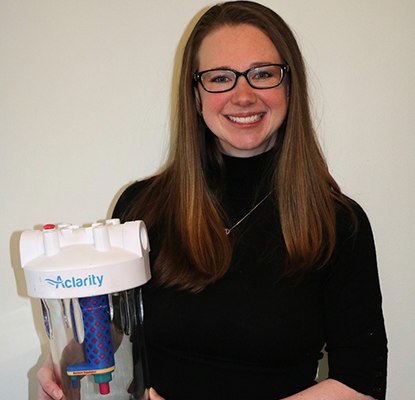Julie Bliss Mullen
Julie Bliss Mullen has always been inspired by technology and discovery and how they affect the daily lives of others. When someone asked her what she wanted to be when she grew up, the little scientist in her would respond with, “a storm chaser, a rock specialist, or a bug collector.” In high school, she took an environmental science elective and was inspired by her teacher who had taken many trips to uninhabited lands where he discovered new plants and animals, survived by eating wild goat, and swam with sharks. “How cool!” she thought and without hesitation, she decided to pursue the environmental field.
Growing up in Uxbridge, MA, Julie was the first person in her family to go to college. She enrolled at Worcester Polytechnic Institute (WPI) as an Environmental & Sustainability Studies major and joined Engineers Without Borders (EWB). As an active member of the EWB chapter at WPI, Julie visited an underprivileged rural community in Guatemala to help solve health problems associated with the lack of access to clean water. Even when she was back on campus, she spent most of her free time trying to develop a sustainable water solution that would ultimately reduce the time spent collecting water and increase drinking water quality. Her time with EWB allowed her to see the important role that innovation and community involvement plays in making a positive impact. This single experience motivated and led her to focus on engineering.
Before she completed her undergraduate degree at WPI, Julie worked at the United States Environmental Protection Agency’s (EPA) Drinking Water Unit. In her senior year, she was awarded the National Science Foundation Graduate Research Fellowship, which solidified her decision to pursue graduate research in water treatment at WPI. Motivated by recent outbreaks of contaminants in U.S. drinking water, Julie focused her graduate research at WPI on evaluating sustainable drinking water processes to treat toxic and carcinogenic contaminants in water. She then decided to continue this research by pursuing a PhD in Civil and Environmental Engineering at the University of Massachusetts, Amherst (UMass). There, she works with her advisor, Dr. David A. Reckhow, as part of the EPA’s Water Innovation Network for Sustainable Small Systems research center, designing, evaluating, and developing a wide variety of novel water treatment technologies for industry.
In 2015, Julie began using the electrochemical water purification technology she prototyped to design, conduct tests, and evaluate its effectiveness in purifying water. The results were astoundingly positive, so in late 2016 she filed an international patent for this technology. Julie was awarded the 2019 $15,000 “Eat it!” Lemelson-MIT Student Prize for her inventive work in the water treatment field.
Through innovation, discovery, and collaboration, Julie hopes to have a positive impact on many of the challenges our society faces. In her career to date, she has already made significant advances, while also taking on mentorship roles. She has served as Vice President of the Student Government at WPI, volunteered for the UMass Summer Entrepreneurship Institute for high school students, and led, taken part in, and served as a panelist for events that encourage girls to pursue degrees in engineering and other STEM (Science, Technology, Engineering, and Math) fields. Additionally, she advised a junior high school student in conducting research for an annual science competition, and served as a teaching assistant for a senior undergraduate environmental engineering lab course, where she led her own lab and lecture session. Julie is the founder and CEO of Aclarity, LLC, a startup spun off from her PhD research at UMass, and she feels empowered to commercialize her technologies outside of the lab to help solve the world’s water quality issues and impact the lives of people globally.


